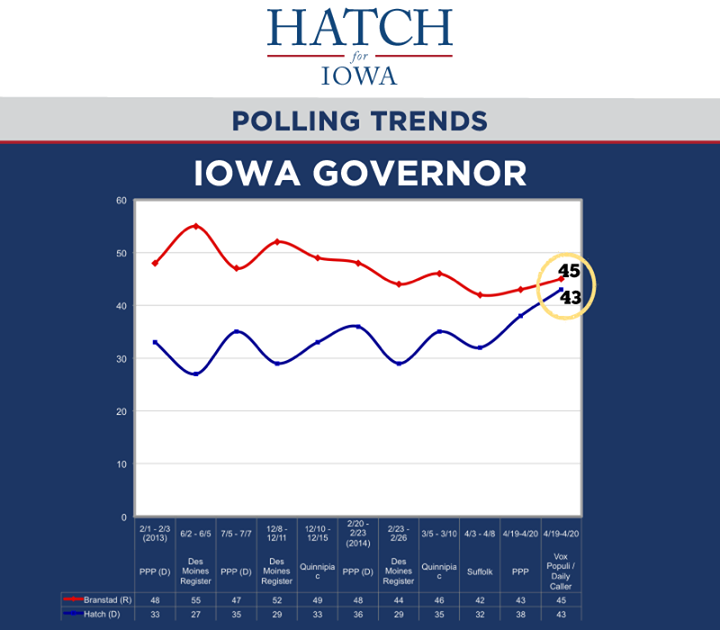The first Iowa survey by a brand-new Republican polling firm, Vox Populi, shows close races for governor and for the open U.S. Senate seat. Toplines for those races and for the 2016 Iowa caucuses are after the jump.
Vox Populi used automated phone calls to reach 600 self-identified Iowa registered voters between April 22 and 24. Toplines from the poll are here (pdf). At this writing, I have not seen further details such as how many respondents were sampled using landlines and cell phones, or the statistical margin of error for the full sample and the Democratic and Republican subsamples.
In the race for Iowa governor, incumbent Terry Branstad led Democratic State Senator Jack Hatch by just 45 percent to 43 percent, with 12 percent saying they didn’t know whom they would support. About 41 percent of respondents are definitely for Branstad, with another 4 percent leaning toward supporting him. Hatch had 36 percent support plus 7 percent leaners.
The published results indicate that Vox Populi didn’t test Democratic U.S. Senate candidate Bruce Braley against specific opponents, only against a generic Republican candidate. Braley led the unnamed Republican by just 42 percent to 41 percent. Among respondents, Braley had 38 percent support plus 4 percent learning his way; the Republican Senate candidate had 35 percent support plus 6 percent leaning. About 17 percent did not know whom they would support in the Senate race.
I’ve enclosed below a few details about the Vox Populi firm and a graphic produced by Jack Hatch’s campaign, showing how much polling of the Iowa governor’s race as changed lately.
I wouldn’t read too much into the Iowa caucus numbers from this poll, as the next presidential election is far off, and the margin of error for a subsample may be quite high. Still, Vox Populi’s findings are yet another nail in the coffin for “Hillary’s Iowa problem” stories. Among Democratic respondents, 71 percent said they would support Hillary Clinton if the Iowa caucuses were held today. Vice President Joe Biden had 13 percent support, followed by Senator Elizabeth Warren (10 percent), New York Governor Andrew Cuomo (3 percent), Montana Governor Brian Schweitzer (2 percent), and Maryland Governor Martin O’Malley (1 percent).
Among Republican respondents, Vox Populi found former Arkansas Governor Mike Huckabee leading the 2016 Iowa caucus race with 20 percent support, closely followed by former Vice Presidential nominee Paul Ryan (19 percent), former Florida Governor Jeb Bush (18 percent), Senators Marco Rubio and Ted Cruz (9 percent each), Senator Rand Paul (8 percent), New Jersey Governor Chris Christie (7 percent), Wisconsin Governor Scott Walker (6 percent), and conservative television personality Joe Scarborough (4 percent). I have no idea why they tested Scarborough and not Rick Santorum, a much more likely 2016 presidential candidate.
Any relevant comments are welcome in this thread.
According to this article by Alexander Burns, Vox Populi is “one of several polling outfits that have been founded since the 2012 campaign; along with Harper Polling, it is the second Republican polling company to launch with the mission of helping Republicans compete in the field of automated polling.”
Burns posted part of a Vox Populi memo explaining the firm’s methodology:
“To reach certain sample demographics and fulfill target quotas, Pop Polling employs a mixed-mode approach to surveys, which includes mobile and traditional landline phone completes. Though the exact proportion of each method changes depending on the target audience, a typical survey includes roughly 20% mobile completes. Mobile interviews help us fulfill quotas for hard to reach demographics. Landline calling is conducted using automated telephone surveys, with benefits including reduced costs, fielding time, and interviewer bias.
“Vox Pop Polling employs stratified sampling to achieve an accurate, generalizable representation of opinion. We utilize this technique by dividing the entire population of interest into groups based on important characteristics (age, sex, region, etc.). We use listed sample for our landline interviews as a way to safeguard the integrity of our representative audience. A listed sample typically includes demographic and geographic information that can be employed during the analysis.
“In order to identify target audiences, we utilize pre- and post-survey screens for registration status and voter history. These screens significantly improve how reflective the sample is to the actual voting population.
“Finally, Pop Polling weights survey results based on projected voter demographics. We do not weight on partisan affiliation or identification, helping reduce the risk of any bias during our analysis process.”
From an April 21 Vox Populi press release:
Press Release: Vox Pop Polling to Release Public Polls as the Fight for Senate Control Escalates
Newly Launched Firm Will Research What is Driving the Political Electorate
Alexandria, VA – Vox Populi Polling a newly launched public opinion research firm based out of Alexandria, Virginia, will be tracking key races this election cycle. The firm will be conducting both public and private polls.
“We are proud to announce the formation of Pop Polling,” said Brent Seaborn. “Our goal is to dig below the surface and into the root of the issues that are driving the public political discourse. The Vox Pop team has worked at all levels of politics from local to presidential elections and are leaders in the world of survey research, communications, advanced analytics, statistics, and political campaign management. Our team is committed to putting that knowledge and experience to work to provide the public with unique and timely insights on the American electorate.”
The partners of Vox Populi Polling are Barry Bennett, Mary Cheney, Stephen DeMaura, Alicia Downs, Frank Sadler and Brent Seaborn.

